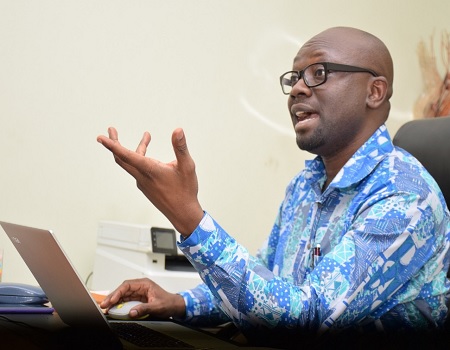
The founder of TheCable online newspaper, Simon Kolawole, has revealed that many professional journalists preferred not to work with online news media organisations including the likes of TheCable.
Kolawole said this in a recent interview with The Interview where he detailed TheCable’s success stories and challenges.
Kolawole said that the management of TheCable initially wanted to establish a print newspaper but the idea was shelved after it realised that most media consumers now use the internet to source for news items.
He noted that despite running an online newspaper, the goal of the organisation is to “a top-notch newspaper that would be respected among those who matter at every level of the society.”
Kolawole said: “We initially wanted to set up a print newspaper, but it dawned on us at a point that online was becoming dominant. Most people were reading stories on their mobile devices. Internet penetration in Nigeria was getting better.
“We also studied the online media in the country and discovered that there were very few professional sites. We felt we had something unique to bring to the table. We wanted to deliver news with speed and simplicity as well as write good features.
“We wanted to produce a top-notch newspaper that would be respected among those who matter at every level of the society.
ALSO READ: COVID-19: Campus journalists charged on collaborative reporting
“Our initial challenge was getting quality hands-on board. Many of the experienced hands would rather work with traditional newspapers than come online.
“We had to start engaging fresh graduates and training them. It was a very big challenge but we seem to have mastered things now.
“Our ethics are well defined in Our Code of Ethics and I must say I am very proud of the team members. They put in their best to live by the ethics of the profession.
“Part of the advantages for us is that we take them straight from the university and are able to help them gain a professional worldview very early in their careers. It is difficult to be preaching ethics to those who are already formed in their ways.”
He noted that TheCable has produced many impact-based stories, particularly on education, corruption and Nigeria’s criminal justice system but feared that nothing has changed for the Nigerian society.
“We have done some stories that produced positive results, so we are glad about that. We did an investigation on Unity Schools and we are glad about the remedial actions taken by the government.
“There are many stories like that. We did an undercover investigation into Customs operations as well as Ikoyi Prisons. They created impact but I am not sure anything has changed.”
On what TheCable seeks to achieve in the next five years, Kolawole, a quintessential columnist said: “We set out to be the most respected quality online newspaper out of Africa. That is a huge task. We want to keep striving at it. We are not there yet, but we are better today than we were yesterday.
“In another five years, we want to be the No. 1 journalism academy in the country, mentoring journalists that will go on to become award winners and industry leaders. We want to be news leaders like the BBC and thought leaders like The Economist.”
He warned other online newspapers not to run a one-man business, adding that online newspapers need to set up professionally in order to gain grounds that will keep the company financially afloat.
“We set out to be different, so our expenses were more than those of the typical website. We had offices in Lagos and Abuja. We set up like a proper company.
“Thousands of sites offering news are operated as one-man business with little costs. They are okay with any advert at any rate.
“That is why they are a-dime-a-dozen. However, we are grateful that our target market recognised us and started patronising us. We are sustained mainly by revenues from adverting and partnerships,” Kolawole said.
I-79 Media Consults Webinar Series for Campus Journalists 2
THEME: THE DYNAMICS OF JOURNALISM IN THE 21ST CENTURY.
Join @GhesheS, @AyinlaRazaq S/W Bureau chief of @BusinessDayNg and @AdejumoKabir2 Director of @CampuspressHub via https://t.co/CXEJZT2ygu@_ACJOAU @gijn https://t.co/Yn4CWTdpio pic.twitter.com/Wju5ZXgsZm
— I-79 Media Consults (@I79Media) May 6, 2020
